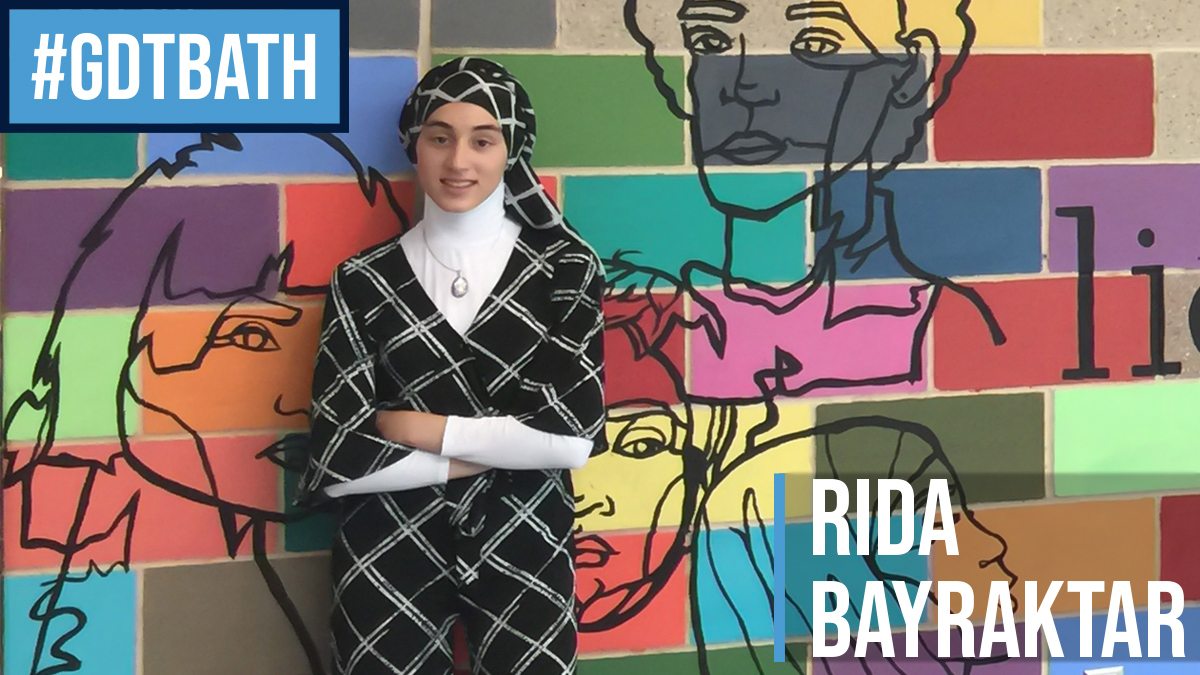#GDTBATH: Rida Bayraktar
Carolina junior Rida Bayraktar founded Pink STREAM to educate, motivate, empower and inspire kindergarten through eighth-grade girls in science, technology, robotics, engineering, arts and math.

As a young girl, Carolina junior Rida Bayraktar never imagined she would be a computer scientist or engineer.
“Before high school, I had that stereotype that STEM was something boys do,” said Bayraktar. “I don’t fit into that profile, so I didn’t even explore any STEM fields. I was good at math, but I didn’t know what I could do with that.”
Bayraktar, who grew up in Turkey, was so good at math that she was selected from a pool of thousands of applicants for the Turkey Youth Foundation Technology Team, an opportunity that allowed her to participate in a year of training in robotics, coding and electronics.
Then when she later joined her high school’s robotics team after moving to Cary, North Carolina, she realized that she was the only girl on the team. Other girls joined but were quickly discouraged and quit within a few weeks, she said.
“There were about 100 boys, and I was the only girl,” she said.
She noticed that most of the boys on the team had prior experience in STEM fields from their childhood, like working with their fathers on cars or playing with math- and science-related toys — experiences she hadn’t had.
“It was very hard for me to catch up, and I always thought that I was falling behind or that I wasn’t as good as them,” said Bayraktar. “I constantly kept studying, and at the end, I studied so much that I became the most successful member of the team.”
Bayraktar thought back to the girls who had quit the team. She wondered what would have happened if those girls had been encouraged to explore STEM fields earlier, like her boy teammates.
Determined to level the playing field for young girls, she founded Pink STREAM as a high school student. The organization works to educate, motivate, empower and inspire kindergarten through eighth-grade girls in science, technology, robotics, engineering, arts and math.
Pink STREAM began by offering free classes to girls at community centers throughout the Triangle area. Now, a little over two years later, Bayraktar and the Pink STREAM team have led courses for more than 900 girls on topics like coding, robotics and 3D printing.
The program is specifically targeted toward students who might not otherwise have access to similar enrichment opportunities.
“What makes Pink STREAM different is that we bring our courses into the communities,” said Bayraktar, who is now a computer science major in the College of Arts & Sciences. “It’s much more accessible, especially to marginalized and lower-income communities, because everyone has access to some part of the community.”
Pink STREAM also aims to inspire students by introducing them to successful women in STREAM fields by offering a course on female scientists and a mentorship program, which connects students with women currently working in industries such as game development.
At Carolina, Bayraktar has continued to build her organization, expanding Pink STREAM’s impact through funding resources like the Robert E. Bryan Fellowship from the Carolina Center for Public Service and the Kenan-Biddle Partnership Grant.
Bayraktar had hoped to use much of that new funding to offer Pink STREAM summer camps, but her plans changed when the coronavirus pandemic prevented the organization from providing in-person courses. Instead, her team shifted their efforts to offer online courses. Bayraktar streamed videos of herself working through electronics kits and circuits, which students could follow along with at home and ask questions.
The online classes were a massive success and allowed girls from around the country to tune in — inspiring Bayraktar to think about how the organization can continue to expand its reach in the coming years.
“I am envisioning Pink STREAM becoming an international organization that impacts young women around the world,” she said. “Women need this, and this will provide them with power and status so that they can be more independent.”
But for now, she’s dedicating herself to her studies and continuing to defy stereotypes— just like she encourages her students to do.
“What I aim to accomplish as a woman in computer science is to be a role model, especially for marginalized women,” Bayraktar said. “We need to change people’s ideas of what it looks like to be a computer scientist, and I want to be someone that does that.”
In September of 2021, Bayraktar was named to The Triangle Business Journal’s list of top innovators and entrepreneurs under 25.




